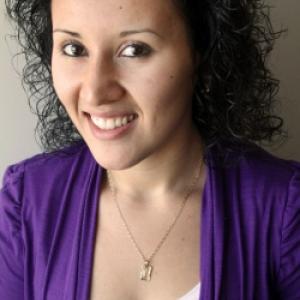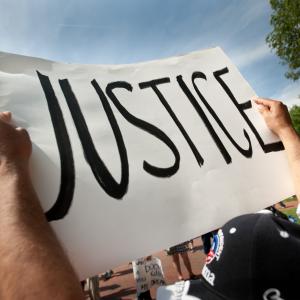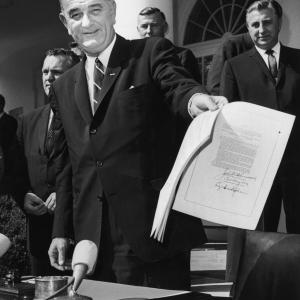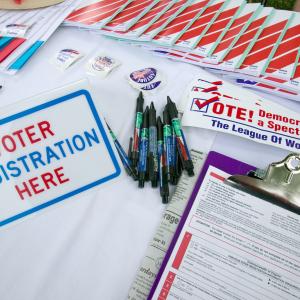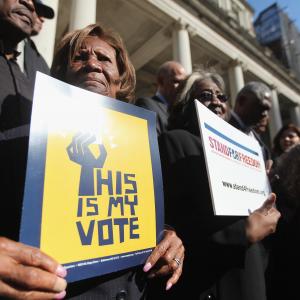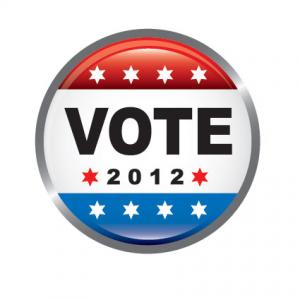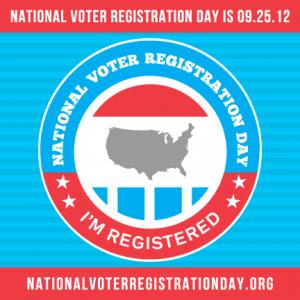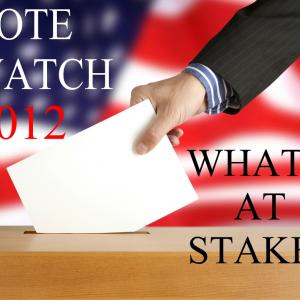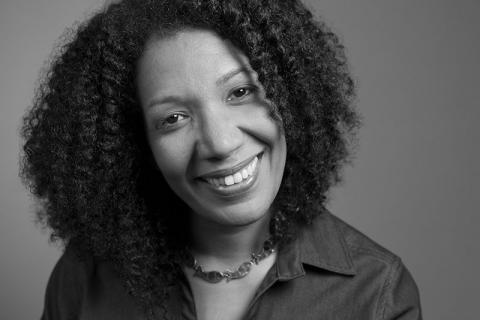
Lisa Sharon Harper, a former Sojourners columnist, is the founder and president of Freedom Road and author of Fortune and The Very Good Gospel. You can follow her work at lisasharonharper.com.
Posts By This Author
My DACA Story
Introduction from Lisa Sharon Harper: Every once in a great while you meet someone who carries in their very body the scars of injustice that we talk about so much at Sojourners. These scars leave permanent reminders of the profound need for every follower of Jesus to follow him in word and deed. It is my great pleasure to introduce you to my friend and colleague, Ivone Guillen. As Sojourners’ Immigration Campaigns and Communications Associate, Ivone has worked tirelessly for the passage of just immigration reform for two years. As a formerly undocumented immigrant, she bears the scars of our unjust immigration system and has experienced the healing that came from changes in immigration policy last year. Please read Ivone’s story. It reflects the stories of millions of people in church pews across the country; people made in the image of God, people waiting for that image to be fully recognized and set free inside our borders.
I remember clearly the day I heard the announcement on deferred action for childhood arrivals (DACA) as I felt an overwhelming surge of emotions in that one moment. A path to opportunity, however fragile and short-term, had finally been created for undocumented young people wanting to become full members of American society.
As I sat on the sofa on the morning of June 15 in front of the television and next to my computer, I felt anxious, excited, and dazed at the same time. There I was, listening to one of the biggest announcements ever made in my lifetime, and it directly impacted me. It was a surreal moment since I had been working with the advocacy community for almost two years and had seen difficult developments take place at the state level on the issue. Then and there, I felt that all of my work was paying off and that change could be achieved with enough persistence and pressure. It was a moment that most people wish to live and see, especially those who have worked in the movement for decades but seldom experience the ultimate triumphs of slow processes.
Gun Violence: How Valuable is a Life?
Death doesn’t make sense — especially when it interrupts the life of one so young. Richard Twiss was only 58 years old.
It makes me think: Richard was one life, cut short by a heart attack. What about all the images of God erased from our lives and families every year through gun violence in the U.S.? What about their families and pastors and youth groups who held vigils in waiting rooms across the country? What about the estimated 1,793 gun deaths since the Newtown massacre? How valuable are their lives?
In Memoriam: Dr. Richard Leo Twiss
On Friday afternoon, I received an email and call from Sue Martel, the editor of Richard Twiss' forthcoming book,Rescuing Theology from the Cowboys: An Emerging Indigenous Expression of the Jesus Way in North America. As we finished the conversation, she shared that she had a vision of someone anointing Richard’s feet with oil. I shared that earlier in the day I felt called to do the same, but I didn’t know the meaning of the vision. On the way to the hospital, I read the story of Lazarus and the grave (John 11: 1-44) and felt called to read it over Richard. So, when I arrived at the hospital, I learned that during the day, Richard’s kidneys failed. I shared the conversation with Katherine Twiss, Richard’s wife and co-founder of Wiconi, and she blessed me to read and to anoint Richard’s feet. As I read, we all wept. I never noticed this before, but the scripture begins with an explanation that Lazarus was the brother of Mary — the one who anointed Jesus’ feet for burial. I anointed Richard’s feet and prayed.
In the prayer, it was clear that we were being called to believe that God was going to do a miracle. It was one of two kinds of miracles: either God was going to say “Richard, come forth!” and call him out of the grave to walk among us once more or God was going to say “Unbind him” (John 11:44a) from this broken body. “Let him go.” (John 11:44b) “It is finished … Well done good and faithful servant,” thus completing the miracle that was Richard Twiss’ life. As we stood around his bed that night we didn’t know which miracle it would be, so we waited.
'Where Were You?'
DURING THE SUMMER of 2003, 25 staff of InterVarsity Christian Fellowship and their families rode a bus through 10 states on the "Pilgrimage for Reconciliation." We retraced the Cherokee Trail of Tears and explored the journey of African Americans from slavery to the civil rights movement.
As we rolled over land that had witnessed the most evil individual acts and public policies enacted on American soil, and as we heard again and again how the church was either silent or complicit, we wondered aloud: "What issue will cause our grandchildren to look back at us and ask, 'Where were you?'"
There are many we could choose from. But on this day, approaching spring 2013—a decade after our pilgrimage, 50 years after Dr. King's "Letter from Birmingham Jail," 150 years after the Emancipation Proclamation—I know where I stand. On this day, I stand with my sisters and brothers in the church who are pressing our nation's leaders toward just and comprehensive immigration reform.
In the last three years, more than 1 million men, women, and children have been erased from our land through deportation. They were caught between two signs at our border: "Help Wanted" and "No Trespassing."
By law, only 5,000 "unskilled" workers are allowed into the U.S. through legal means each year. That is about the number of people processed on Ellis Island every day in the early 1900s. Meanwhile, our nation's industry and food supply rely heavily on the labor of immigrant populations. About 75 percent of all U.S. farmworkers are unauthorized immigrants. Then consider other industries: meatpacking, hospitality, restaurants, transportation. The disparity between the demand for workers and the supply is untenable.
Christian Churches Come Together on Immigration Reform
Last week Christian Churches Together in the USA gathered in Austin, Texas for its 7th Annual Meeting. CCT represents the breadth of Christian denominations in the United States, including historic Protestant, Catholic, Orthodox, evangelical Protestant, and historic black church denominations. In subsequent years CCT focused on issues of poverty and racism. This year leaders of this diverse body of Christian denominations focused on the need for broad reform within the U.S. immigration system.
Over the course of four days, this broad coalition of heads of communion and ecumenical officers learned the history of Immigration Reform in the U.S., sought biblical counsel, watched films about life along America’s southern border, and listened to the testimonies of “DREAMers," undocumented domestic workers, and asylum-seekers. In the end the five families of the church in the United States reached consensus on a statement calling for just and humane immigration reform that includes an “earned path to citizenship."
Immigration Profile: Is There Room for Redemption?
Five year-old Tony Amorim sat with his dad in a van in Danbury, Conn., in 1989.
“Do you want to come with me,” his father asked him, “or do you want to stay with your mother?”
Tony loved them both, but the boy couldn’t imagine living without his father.
“I want to go with you,” Tony answered.
Right then and there Tony’s father drove away and took him to the far-away land of Florida.
Last week, I interviewed Tony, now 28, on the phone. I couldn’t call him directly because he is in Norfolk County Correctional Center awaiting his deportation hearing scheduled for today.
Tony’s voice was tight. He was eager to share his story — his whole story.
On the face of it, his case is simple. According to a Notice to Appear, issued to him by the Department of Homeland Security, Tony is a native and citizen of Brazil who entered the U.S. through Orlando, Fla., on a Nonimmigrant Visitor for Pleasure Visa in 1985. In 1995, Tony was granted Lawful Permanent Resident status by an immigration judge. He was 11 years old. In 2004 he was arrested and convicted for possession of narcotics. Four years later he was arrested and convicted again for possession of narcotics with intent to sell and for possession of a pistol.
It sounds like Tony is the poster child for the kind of person who should be deported: two felony convictions and possession of a gun. But you haven’t heard the whole story.
What Do We Stand For?
On New Year’s Eve I wrote “The Top 10 things I’m thankful for in 2012” on my Facebook page. Number four was “Clarity of call and message.” A friend asked in a comment below the post: “How in your own life has this played out? I'm at a crossroads here and It's difficult for me to discern this right now … Feel like I'm just drifting.”
Many of the people sitting in pews across America understand what my friend is going through. “Drifting,” that’s how he put it. In fact, I think it’s a question many people are wrestling with in their daily lives. There are so many issues out there. There are so many hills to die on. There is such deep division in our politics and in the church. Wading through the sound bites gets tiring. How can one make sense of it all? It’s tempting to just give up and disengage like the many Christians did in the mid-20th century.
But we cannot.
A Heart for Peace
A VARIETY OF EVANGELICAL peacemaking efforts have sprung up in recent years, from the Two Futures Project, which seeks a world without nuclear weapons, to the World Evangelical Alliance’s Peace and Reconciliation Initiative, which seeks to redress the fact that “in our zeal for evangelism, we have often overlooked the biblical mandate to pursue peace.”
This fall, evangelicals from a range of viewpoints gathered at Georgetown University in Washington, D.C., exploring what a distinctive evangelical contribution to peacemaking might look like. The essays below, unless otherwise noted, are taken from the first Evangelicals for Peace conference, a “summit on Christian moral responsibility in the 21st century.” Organizers hope to publish a book with the entire collection of talks. —The Editors
-----
‘All the Easy Jobs Have Been Done’
Standing on a rich tradition of peace and transformation
by Geoff Tunnicliffe
WHY IS PEACEMAKING an important topic for evangelicals? As a global community of 600 million Christians, our churches are confronted daily with the impact of illegal weapons. Our hospitals treat the victims of violence. Our church leaders counsel the traumatized. All forms of conflict negatively impact our development programs. Our aid agencies seek to care for and rehabilitate child soldiers. Our inner-city communities are confronted with the outcomes of gang warfare.
For all of us who say we are followers of Jesus, as we observe or experience the brokenness of our world, it should break our hearts. If we feel the pain so deeply, I can’t imagine what our loving God feels. The One who is called the Prince of Peace. The One who laid down his life, so that we could be reconciled to God and each other.
The World Evangelical Alliance’s engagement in peacemaking stands on the rich traditions of evangelicals who have devoted themselves to being instruments of social change and transformation. We want to say loudly that we evangelicals want to be on the forefront of peacebuilding. All the easy jobs have been done. It’s just the tough ones that are left. It requires clear vision to face these challenges.
We as evangelicals are committed to working together with those in and outside our community for the good of all. May God empower us through the work of his Spirit to be his ambassadors of peace and reconciliation.
An Advent Reflection: The Pregnant Church
I had a conversation with a young woman I met at a conference recently. The conversation rocked me.
I represented the faith voice on a panel at a major secular conference for philanthropists. The panel focused on the question: “What are we not talking about?”
One of my colleagues focused on the nonprofit sector’s inability to make real just change in our world because they are bound by the interests of donors who are, themselves, part of the 1 percent. Another colleague focused on the glut of nonprofits offering similar services in otherwise abandoned communities. I focused on the need for social movements to bring about a more just world and the role of faith communities in those movements, in particular.
Grover’s Gofers: Between a Rock and a Hard Place
Soon after George W. Bush won his first presidential election, Washington lobbyist, Grover Norquist, helped craft the tax cut legislation that would go down in history as “the Bush-era tax cuts.” Among other things, the legislation dropped top marginal tax rates from 39.6 percent to 35 percent and was written to expire on Dec. 31, 2010.
In 2010, Democrats tried to put forward two separate packages of legislation that would extend the cuts, first for earnings up to $250,000, then for earnings up to $1 million. The Democratic-led House passed both bills, but Republican filibuster blocked both in the Senate. President Barack Obama resolved the stalemate by extending all the Bush tax cuts for two more years.
Here’s the irony: Republicans claim to hate deficits, but the facts are clear. If extended indefinitely, the Bush-era tax cuts will account for nearly half of America’s budget deficit by the year 2019.
The Seeds of Epiphany
In the dark days of Advent, we wonder when the birth pangs will end: Will light break into the darkest corners of our hearts, our families, our lives? Will God—can God—take the twisted sinew of our warped world and redeem it? Will we—can we—hold on through the night? Can we trust that light to come? These are the questions of Advent.
As we enter the season of Epiphany, new questions arise: Will we allow the light that has broken forth to illuminate the darkest corners of hearts, our families, and our lives? Can we—will we—follow Jesus as he untwists the mangled metal of our shattered souls ... and redeems it? Can we—will we—trust the light or will we hide from it? These are the questions of Epiphany.
The light of Epiphany illuminates in two directions: It flashes inward, revealing our twisted and fragmented souls, and it flashes outward, revealing the carnage and consequences of the lies our world has embraced and used to craft public policy, the lies we have believed and reinforced through our complicit acceptance, and the truth we must speak.
As we enter 2013, we look back and see that over the past four years much public good was done. Remember: The Lilly Ledbetter Fair Pay Act made it easier for women to fight pay discrimination. Remember the drama when Congress passed the Affordable Care Act and the Supreme Court upheld it, creating a path for tens of millions of Americans to finally receive health care. Remember the image of the last troops leaving Iraq.
Take Action: Holiday Thanks and Letters in Solidarity
Speaking of the widow’s offering, Jesus says: “Truly, I tell you, this poor widow has put in more than all those who are contributing to the treasury. For all of them have contributed out of their abundance; but she out of her poverty has put in everything she had, all she had to live on.” (Mark 12:41-44)
Today, families across America will gather round tables full of food. They will hold hands and pray. They will give thanks for the blessings that have come to each member over the past year. Some of these families’ tables will be covered with turkeys, stuffing, cranberry sauce, and yams; symbols of abundant blessing. Others will give thanks over Hillshire Farms sliced turkey sandwiches on Wonder bread; symbols of blessing in the midst of hard slog of poverty. Though their tables are bare, their thanks offerings are full of power. For, like the widow’s offering, Jesus reveres the offerings of the poor.
This Thanksgiving, as your family holds hands and give thanks and as your church packs Thanksgiving dinner baskets, and this Christmas season churches prepare gift baskets for those Jesus called “The Least of these” (Matthew 25:40) we at Sojourners ask you to do one more thing: Take five minutes and handwrite a simple letter to your member of Congress.
Watch the Vote: A Prayer for America
It’s here, God — Election Day in America. Today is the day when Americans everywhere are given the privilege and responsibility to exercise dominion (agency) at the polls.
Scripture tells us every human being is made in the image of God. We are, therefore, equally worthy of protection of the law. The United States Constitution and its Amendments tell us we are equally worthy of life, liberty, and the pursuit of happiness. Yet, at this very moment, laws stand poised to snatch dominion from the hands of the poor, the weak, and the vulnerable, ethnic minorities, students, and the elderly. Some scurrilous elected officials have worked behind the scenes to suppress the ability of voters to elect the person of their choice — all for the sake of politics
Watch the Vote: God Will Part the Waters
In four days our nation will decide its course for decades to come. On Nov. 6, ordinary people who have not already sent in their absentee ballots or stood in line to vote early, will walk, drive, caravan, and bus their way to polling stations scattered across every state in the nation. These ordinary people will exercise their right as American citizens to vote. They will also exercise their God-given call, as human beings made in the image of God, to exercise dominion (agency) within our grand democracy. Or at least they will try.
The deep waters of injustice are rising high and threatening to spill over on Nov. 6. Voters will have to wade through muck and mire to cast faith-filled ballots this year. So, listen up, study up, and get your gear on in preparation for Nov. 6.
Watch the Vote: The Ground Game
For the next 12 days it’s all about the ground game. With most voter registration deadlines passed, the fight against voter suppression has shifted focus from registration drives to calling banks, car-pools, and calls to vote early.
Bishop Dwayne Royster is Executive Director of P.O.W.E.R. (Philadelphians Organized to Witness Empower and Rebuild), a 37-member interfaith organizing coalition in Philadelphia. Royster is also lead pastor of Living Waters United Church of Christ in Philadelphia. In a recent interview Bishop Royster explained just how vital the fight against voter suppression has been for the people of Philadelphia.
According to a study conducted by the Pew Charitable Trust’s Philadelphia Research Initiative, Philadelphia is the 6th poorest large city in America with a poverty rate that held at 25 percent in 2011. The unemployment rate is higher than the national average at 11.5 percent, and nearly half of all high school students engage in a fist fight at least once in the course of a year. Tensions are high in the City of Brotherly Love.
Bullying: This Is My Story
Twenty-five cents was all it took. It was like magic. The punches stopped and for the first time in a long time I felt what it feels like to be normal — to be safe, to be lovable, to live without a target on my back.
But even the transaction was not a guarantee of love.
Though I continued to bring quarters that fed the monster’s craving every day, after a while even their magic stopped working.
The torture started again on the playground after school.
I walked across the schoolyard and headed home, which was only a half-block away from the school. Suddenly I was surrounded by Alice and her goons. She taunted me and pushed me, then punched me. It didn’t stop. It became a ritual.
Soon, every day, armed with only my book bag, I would duck my head and make a beeline for my house and Miss Burton (the babysitter). And every day Alice and her bulldogs would hunt me down and taunt me and push me and punch me as I walked the looooong half-block home.
Mom asked one day what I was doing with all those quarters. When I told her, she marched up to the school and had it out with Miss Williams and then my principal. I was only in that school for one year.
Alice wasn’t the last bully I had to survive. There were others. There was Tracy in the fifth grade and two white girls whose names I’ve blocked out in eighth grade. For a long time I thought I must have an invisible target attached to my back.
Watch the Vote: Is the Voting Rights Act Still Needed?
The 15th Amendment to the United States Constitution was the third in a triad of amendments crafted to protect the rights of recently emancipated African Americans. The 13th Amendment abolished slavery. The 14th Amendment granted citizenship to people who were once enslaved, regardless of race. The 15th Amendment, which was passed by Congress February 26, 1869 and ratified February 3, 1870, reads:
Section 1.
The right of citizens of the United States to vote shall not be denied or abridged by the United States or by any State on account of race, color, or previous condition of servitude —
Section 2.
The Congress shall have the power to enforce this article by appropriate legislation.
It took nearly a century of blood, terror, and tears, but in 1965 President Lyndon B Johnson and the 89th U.S. Congress passed the Voting Rights Act of 1965; legislation to enforce the 15th Amendment. Finally.
One year more than a decade later, in 1976, I walked hand-in-hand with my mother trudging up and down city blocks lined with row houses in our West Oak Lane neighborhood of Philadelphia. Each time we knocked and a neighbor came to the door, my mom, who served as the judge of elections for our neighborhood, asked: “Are you registered to vote?” If they weren’t, out came the clipboard.
I didn’t understand the legacy we were a part of that day, but with each sweep of the clipboard we were brandishing a non-violent weapon in the long fight of our ancestors to be and stay free. For 100 years — that’s five generations — they faced down the terror of burning crosses, threats to life and livelihood, and the elaborate labyrinth of Jim Crow voting laws — all set up to suppress their votes, all set up to crush their ability to exercise dominion.
So, when the Supreme Court announced recently that one of the cases it would take up in this session was a challenge to Section 5 of the Voting Rights Act, the hairs rose on the back of my neck.
Watch the Vote: 28 Days, 13 States, 1 Prayer
Editor's Note: This is the third article in Lisa Sharon Harper’s election season blog series, Watch the Vote. You can read the last article here.
With 28 days to go until our nation chooses its 45th president, a string of court victories have knocked down Jim-Crow-style barriers to voting that have been erected in states across the nation. But 13 states are still under the oppressive weight of laws designed to suppress the vote.
According to the Brennan Center for Justice, starting in early 2011, 41 states introduced legislation to restrict voting laws. Nineteen quietly passed 25 laws and two executive actions, some of which require government-issued photo IDs, proof of citizenship, fewer early-voting days, the elimination of Election Day voter registration, created barriers to voter registration drives, and created more obstacles for citizens with past criminal convictions.
The good news is that over the past few months we have seen one court case after another block the enactment of the worst provisions of these new Jim Crow laws. According to a recent Brennan Center study, 10 courts have blocked or blunted restrictive voting laws — and the Department of Justice blocked one more — since Oct. 3.
Watch the Vote: #925NVRD
Editor's Note: This is the second article in Lisa Sharon Harper’s election season blog series, Watch the Vote. Read the first HERE.
A few folks got a brilliant idea and brought a bunch of organizations together to declare September 25, 2012 as the first ever National Voter Registration Day! Aka, for the Twitterverse, #925NVRD. Woot, woot!
Maybe, like me, you’ve moved since the last election. Or maybe you’ve just turned 18. Or maybe, somehow, you managed to sleep through the last two elections. Don’t know how you did it, and I’m not judging, but brother, son, sister, daughter, today is the day to get right with the Lord. In times like these no one can afford to sit back and watch this one like a reality show on Bravo TV. Exercise your dominion; register to vote today!
Watch the Vote: What's at Stake?
[Editor's Note: This is the first article in an election season blog series called Watch the Vote.]
In today's hyper-politicized climate, all of the hoo-hah about voter suppression can sound like a bunch of partisan pandering on both sides.
If you're just tuning now, it can easily look like Democrats are whining and crafting conspiracy theories over something that really won't matter in the end, anyway — so why waste your breath?
Or, for the even more cynical, sure, it might matter, but there's nothing we can do about it — so again, why waste our breath?
Here's why. Check this out.
